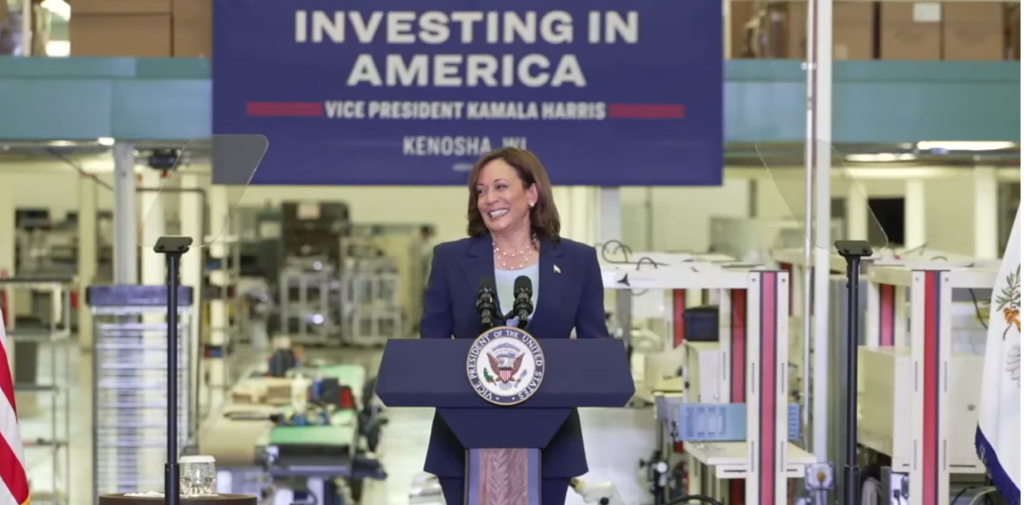Nokia Fiber Electronics Facility Likely to Alleviate ‘Buy America’ Concerns, Industry Says
Nokia will continue to invest in American manufacturing in the coming years, said CEO.
Teralyn Whipple

KENOSHA, Wisconsin, August 3, 2023 – Analysts expressed optimism that Nokia’s Thursday announcement of an extensive fiber electronics manufacturing here will essentially eliminate concerns in the broadband industry about current Buy America requirements for federal investment.
On the same day as Nokia’s announcement of a manufacturing facility with Sanmina Corporation, a research note from New Street Research Policy Advisor Blair Levin, the Nokia plant, a new Corning plant and a limited waiver of Buy America rules for the Broadband Equity, Access and Deployment program expected later this summer will now make it possible for BEAD subrecipients to comply with the Buy America mandates.
At the ceremonial announcement of the facility on Thursday afternoon by Kamala Harris, the vice president was joined by Commerce Secretary Gina Raimondo and Senator Tammy Baldwin, D-Wis.
“For years, manufacturing was the foundation of the economy here,” said Harris. Between 1990 and 2010, America lost more than 6 million manufacturing jobs, she said, claiming that the Biden Administration would reverse this process and give Americans “what they really need.”
“We are determined to create jobs in America and keep jobs in America, all of which leads us to today,” said Harris. Nokia is set to hire up to 200 new employees, build parts that are needed to connect people to high-speed internet, and onshore American manufacturing, she said. There is no limit to what we can achieve for nation, Harris concluded.
Raimondo celebrated the investment, saying it is the most sophisticated technology to be made in the United States. She concluded, “where is it written that we can’t manufacture in America? Nowhere.”
CEO says: ‘Nokia gets the job done’
Nokia CEO Pekka Lundmark said at the announcement that the electronics will be available in 2024 and will help the deployment of the Broadband Equity Access and Deployment program. “Nokia gets the job done,” he said, saying that the company has worked to invest in American jobs since the announcement of the BEAD program.
“We don’t plan to stop here,” Lundmark claimed, saying that the company will invest in more manufacturing plants in the coming years.
“The America worker is the best and most productive worker in the world,” added Sanmina CEO Jure Sola, to applause. He expressed their gratitude for the partnership with Nokia and hope for the future that the company will continue to grow
Nokia’s announcement is the latest of domestic manufacturing announcements spurred by the Biden Administration’s Made in America policies which seeks to support America’s manufacturing economy.
“Across the high-speed internet industry, most electronics products are not currently manufactured in the U.S., but Buy America provisions in the Bipartisan Infrastructure Law are driving the onshoring of new manufacturing, particularly ahead of implementation of the $42.5 billion Broadband Equity, Access and Deployment program,” said the White House.
Other companies and analysts comment
Although Nokia’s announcement is the first of its kind to manufacture core electronic components of its fiber equipment in America, several fiber providers have announced similar investments in American manufacturing.
Corning, producer of optical fiber and cable, announced in June that it is opening a new manufacturing campus of passive optical equipment, rather than electronics, in North Carolina. Although the company declined to comment on Nokia’s announcement, a Corning spokesperson said of their North Carolina investment that it “is part of a series of investments by Corning in fiber and cable manufacturing totaling more than $500 million since 2020. Altogether, these investments nearly double Corning’s ability to serve the U.S. optical cable market – ensuring strong U.S. supply of optical fiber and cable to support network buildouts fund by the federal government’s BEAD program.”
Robert Conger, senior vice president of technology and strategy for fiber provider Adtran, told Broadband Breakfast of the Nokia announcement that “Adtran has been manufacturing networking equipment right here at our headquarters in Huntsville, Alabama, for nearly 30 years. With our state-of-the-art facility and broad fiber networking portfolio that covers solutions ranging from the optical core to the customer premise, we’re one of the only vendors already primed to help service providers comply with Build America, Buy America.”
The Commerce Department is expected to release a limited BEAD Buy America waiver by late August, say industry sources.
According to Levin, “while the limited waiver still must be filed and ruled on, we [New Street Research] feel confident that the BEAD program will not hit any speed bumps related to the Buy America provisions.”
This follows comments by industry leaders urging NTIA action on Buy America waivers to enable effective BEAD build outs, claiming that not doing so will add complexity to an already complicated supply chain.
Other private investments
Provider of broadband network equipment CommScope recently announced a $60 million investment toward expanding its U.S. fiber optic cable manufacturing in North Carolina. The investment is set to create more than 250 new jobs over the next five years and create a fiber optic cable designed for rural networks.
Prysmian, a manufacturer of fiber optic cable, announced that it will invest $30 million to convert its Tennessee copper cable facility into a fiber optic cable manufacturing plant.
Buy America requirements ensure that 55 percent or more of iron, steel, fiber and construction materials as part of federally funded programs are manufactured in the U.S. The requirements follow the CHIPS and Science Act and Inflation Reduction Act which invest in American manufacturing for semiconductors and green energy plants.
According to the White House, the private sector has already invested more than $500 billion in new domestic manufacturing for semiconductors, electric batteries, electric vehicle charging, rail manufacturing, water parts and more.








